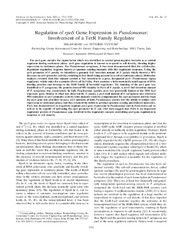Приказ основних података о документу
Regulation of rpoS gene expression in Pseudomonas: involvement of a TetR family regulator
| dc.creator | Kojić, Milan | |
| dc.creator | Venturi, V | |
| dc.date.accessioned | 2023-10-12T12:36:03Z | |
| dc.date.available | 2023-10-12T12:36:03Z | |
| dc.date.issued | 2001 | |
| dc.identifier.issn | 0021-9193 | |
| dc.identifier.uri | http://intor.torlakinstitut.com/handle/123456789/795 | |
| dc.description.abstract | The rpoS gene encodes the sigma factor which was identified in several gram-negative bacteria as a central regulator during stationary phase. rpoS gene regulation is known to respond to cell density, showing higher expression in stationary phase. For Pseudomonas aeruginosa, it has been demonstrated that the cell-density dependent regulation response known as quorum sensing interacts with this regulatory response. Using the rpoS promoter of P. putida, we identified a genomic Tn5 insertion mutant of P. putida which showed a 90% decrease in rpoS promoter activity, resulting in less RpoS being present in a cell at stationary phase. Molecular analysis revealed that this mutant carried a Tn5 insertion in a gene, designated psrA (Pseudomonas sigma regulator), which codes for a protein (PsrA) of 26.3 kDa. PsrA contains a helix-turn-helix motif typical of DNA binding proteins and belongs to the TetR family of bacterial regulators. The homolog of the psrA gene was identified in P. aeruginosa; the protein showed 90% identity to PsrA of P. putida. A psrA::Tn5 insertion mutant of P, aeruginosa was constructed, In both Pseudomonas species, psrA was genetically linked to the SOS lexA repressor gene. Similar to what was observed for P. putida, a psrA null mutant of P. aeruginosa also showed a 90% reduction in rpoS promoter activity; both mutants could be complemented for rpoS promoter activity when the psrA gene was provided in trans, psrA mutants of both Pseudomonas species lost the ability to induce rpoS expression at stationary phase, but they retained the ability to produce quorum-sensing autoinducer molecules. PsrA was demonstrated to negatively regulate psrA gene expression in Pseudomonas and in Escherichia coli as well as to be capable of activating the rpoS promoter in E. call. Our data suggest that PsrA is an important regulatory protein of Pseudomonas spp. involved in the regulatory cascade controlling rpoS gene regulation in response to tell density. | en |
| dc.publisher | Amer Soc Microbiology, Washington | |
| dc.rights | openAccess | |
| dc.source | Journal of Bacteriology | |
| dc.title | Regulation of rpoS gene expression in Pseudomonas: involvement of a TetR family regulator | en |
| dc.type | article | |
| dc.rights.license | ARR | |
| dc.citation.epage | 3720 | |
| dc.citation.issue | 12 | |
| dc.citation.other | 183(12): 3712-3720 | |
| dc.citation.rank | M21 | |
| dc.citation.spage | 3712 | |
| dc.citation.volume | 183 | |
| dc.identifier.doi | 10.1128/JB.183.12.3712-3720.2001 | |
| dc.identifier.fulltext | http://intor.torlakinstitut.com/bitstream/id/1845/Regulation_of_rpoS_Gene_Expression_pub_2001.pdf | |
| dc.identifier.pmid | 11371535 | |
| dc.identifier.scopus | 2-s2.0-0034991107 | |
| dc.identifier.wos | 000168990400020 | |
| dc.type.version | publishedVersion |

